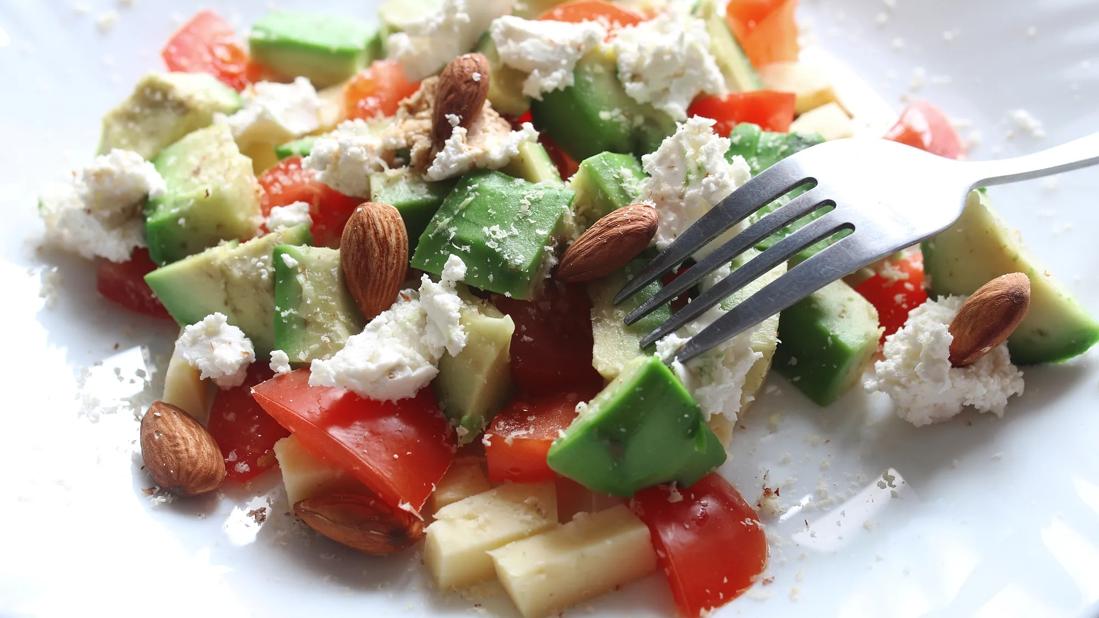Avocados, cheese and nuts are high in calories but have big health benefits

Image content: This image is available to view online.
View image online (https://assets.clevelandclinic.org/transform/99c0ea68-1068-4ece-9c57-681c5b44cf1c/avocado-cheese-nuts-859788298)
Plate of avocado, tomato, cheese and almond salad
When you hear the words “high-calorie foods,” what comes to mind? Cake? French fries? Pasta with heavy cream sauce?
Advertisement
Cleveland Clinic is a non-profit academic medical center. Advertising on our site helps support our mission. We do not endorse non-Cleveland Clinic products or services. Policy
No healthcare professional would describe those foods as “nutrient-rich.” But there’s a category you might be forgetting about: healthy, high-calorie foods.
Yes, such unicorns do exist. And, yes, they have a place in your diet.
Not all high-calorie foods are created equal. Healthy high-calorie foods can benefit your body. Unlike, say, high-calorie fallbacks like potato chips and soda. They’re calorie-rich but lacking in nutrients.
Healthy high-calorie foods are often recommended for people who have underweight and need to safely add pounds. But just about everyone can benefit from making some smart, healthy high-calorie choices. That’s to say, foods that are high in calories and contain a good helping of nutrients your body needs.
“When we talk about healthy high-calorie foods, they're usually the ones that are high in healthy fats, protein and fiber. That’s what makes them good for you,” says registered dietitian Devon Peart, MHSc, RD. “That all contributes to a higher calorie count — but that also means they’re filling. So, you don’t need to eat much of them to feel satiated.”
Think of it this way: One of those chocolate sandwich cookies with double the cream (you know the one) has 70 calories. But it’s not a stretch to say you could easily eat at least two in a sitting, right? That’s 140 calories. And yet you still feel like you could go back for more — and more and more.
Advertisement
For a similar number of calories, you can eat one-third of an avocado on a slice of multi-grain bread. Healthier, for sure. And also less likely to leave you with a sugar crash and searching the pantry for another little something 10 minutes later.
Peart shares her top three healthy high-calorie foods.
Avocados pack a solid punch of vitamins, minerals and healthy fats.
One-third of an avocado has about 80 calories — that’s the same as a half can of soda. But in those avocado calories are a host of body-boosting nutrients, like folate, vitamin K, fiber and heart-healthy monounsaturated fats.
That can of soda? Zero health benefits.
Peart recommends eating no more than about 1/3 of an avocado per day to balance the calories with the benefits.
Looking to get more avocados in your life? Try these simple ways:
Cheese doesn’t necessarily scream “health food,” but done right, it can be a healthy high-calorie addition to your diet.
“A bit of cheese can be really good for you, but too much can contribute to high cholesterol,” Peart clarifies. “So, be mindful of the amount you eat.”
Cheese is high in calcium, which is oh-so-important for keeping your bones healthy and strong. It can also be a good source of protein. And some cheeses even have a good amount of heart-healthy omega-3 fatty acids.
But choosing the right cheese is important. So is watching your serving sizes.
“Hard cheeses are your better bets. Soft, creamy, spreadable cheeses have more saturated fat,” Peart points out. “And keep in mind that a serving of cheese is 1.5 ounces. Sticking to that amount can give the calcium and other benefits, without too much fat or sodium.”
Here’s what 1.5 ounces of some common cheeses will get you:
Nuts are a good source of fiber and protein. And depending on the variety, they can also come with a healthy helping of vitamins and minerals, like:
Advertisement
But nuts can also be high in fat. The good news? It’s the heart-healthy unsaturated kind.
Of course, there are a lot of nuts to choose from. Is one kind “best” for you?
“Different nuts have different benefits. No one is a clear winner,” Peart notes. “Micronutrients are widely distributed among foods. So, the best way to benefit is by having a variety.”
Again, portion sizes matter. Stick to a serving size of about 1 ounce (1/4-cup) of roasted unsalted nuts. That’s about a handful. That will net about 160 to 200 calories and a mix of healthy nutrients.
High-calorie foods get a bad rap. And yes, those high-calorie, packaged snacks and desserts won’t do your well-being any favors.
High-calorie foods that are rich in nutrients? Bring ‘em on! (But still in moderation.)
Advertisement

Sign up for our Health Essentials emails for expert guidance on nutrition, fitness, sleep, skin care and more.
Learn more about our editorial process.
Advertisement
Lifestyle changes can bring a slight metabolic boost and health benefits
It depends on factors like your age, activity level and if you want to maintain, lose or gain weight
Calorie counts on nutrition labels can be off by up to 20%
Calorie reduction can do more than just help you lose weight — it can also lower age-related inflammation
Your metabolism may torch 1,300 to 2,000 calories daily with no activity
Consuming fewer calories than your body burns is a ‘calorie deficit’ that can lead to weight loss
Understand how your body creates energy to take your fitness to the next level
When free radicals don’t have antioxidants to keep them in check, they go rogue
Prioritize your health by managing stress, strengthening your social connections and getting quality sleep
Bolsters, blankets, pillows and blocks can offer extra support, stability and comfort
Allergies, postnasal drip, asthma or reflux could be to blame for a cough that won’t quit